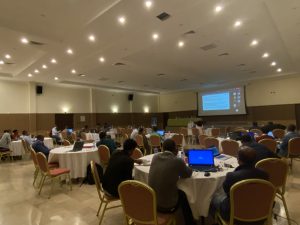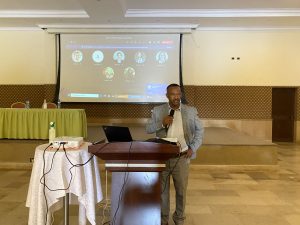December 15,2021-The Global Green Growth Institute (GGGI) and the Environment, Forestry and Climate Change Commission (EFCCC) in collaboration with Agence Française de Development (AFD) convened a two-day workshop to validate the Business as Usual (BAU) Scenario of the Ethiopia’s Long-Term Low Emission Development Strategy (LT-LEDS) project from December 15-16, 2021. The workshop brought together a total of 47 participants including GGGI international technical experts, as well as national technical experts that are nominated by sector ministries, National Planning Commission and EFCCC.
The overall aim of the BAU validation workshop was to present the results and assumptions of the BAU scenario in all sectors, gather feedback and inputs from national stakeholders and experts in a bid to validate the BAU scenario, including assumptions and the methodologies.
Ethiopia is preparing its LT-LEDS 2050 strategy in line with the Paris Agreement. In accordance with Article 4, paragraph 19 of the Agreement, signatories should strive to formulate and communicate LT-LEDS and are also duty-bound to communicate their strategy to the Secretariat. GGGI is leading the development of the Ethiopia’s LT-LEDS strategy with the financial support secured from AFD of the French Republic.
In due course of the Workshop, sectoral working group leads made presentations and tabled for discussions thematic issues including BAU modelling, assumptions, methodology as well as projection results, and relevant inputs deemed essential to speed up LT-LEDS strategy development were sought.
The composite of sectoral groups includes Waste, Agriculture, IPPU, Forest, Adaptation, Macro-economy, and Energy sectors. Deliberation was made on ways of addressing the pressing challenges faced in the BAU modelling process, and further cooperation was enhanced across the sectors. The government assigned experts from the line ministries, who have been actively engaging in the LT-LEDS strategy development process, provided inputs on the process, and suggested copying mechanisms to address the challenges encountered during the preparation of the draft BAU and modelling exercise.

Moreover, a breakout session for thematic group exercise was organised to allow discussion on the validation of the thematic BAU modelling, assumptions and methodologies used, and to incorporate all the feedback that was raised from the participants of the workshop. Guiding questions for each sector was prepared to facilitate the discussion and assess further data needs.
As a way forward, it was recommended that the sectoral working group conclude the requirements on the additional data sets and provide input for the BAU modelling finalization. It was also agreed for the GGGI thematic leads to provide ongoing training for local experts on BAU modelling until the BAU final document is completed. It was further decided that wider stakeholders’ consultations be held early next year to present the final BAU and policy identifications.
